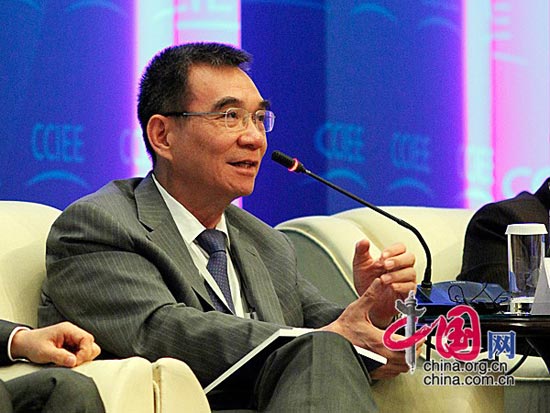The quest for prosperity
- By Heiko Khoo
 0 Comment(s)
0 Comment(s) Print
Print E-mail China.org.cn, August 12, 2013
E-mail China.org.cn, August 12, 2013
Lin claims that the so-called dual-track transition in China since 1979, where state intervention and state ownership remains dominant whilst market relations expand, has maintained distortions, which result in huge state-owned corporate savings and supports large state enterprises and wealthy private corporations. One problem with this theory is that the era of so-called "transition away from planning" (1979-2013) has lasted 34 years, whereas the era commonly called the "planned economy era," (1949-1979) lasted only 30 years. This begs the question: Is China's pathway really towards what Lin calls 'a real functioning market economy' or not? It seems strange that the transition from an apparently utterly dysfunctional planning system lasts longer than the system itself!
|
|
|
Justin Yifu Lin, former chief economist at the World Bank. [Photo/China.org.cn] |
Lin believes that inequality in China and the repressed consumption of the masses is due to large state-owned companies and wealthy private individuals distorting the economy, hoarding savings and stifling consumption. But state-owned enterprise revenues and savings are resources which indirectly belong to the people as a whole. They are the primary means which permit government targets, such as those for public sector housing, road building and railway construction, to be met. It is misleading to erect an artificial wall between such public property and the people and to present wealthy private companies and wealthy state-owned companies as if both are equal. A transition that entails changing to an economy in which the nation's largest enterprises and banks are in private hands will not help growth but undermine it. Such a "real market" economy would destroy the ability of the state to carry out its policies - as finance and business would invest only for profit and not to meet public policy objectives.
Lin's book, The Quest for Prosperity, argues that high-income countries need to stimulate their economies in environmental sectors and that China should aggressively invest in bottleneck infrastructure projects such as education, social protection and energy efficiency. Poor countries could benefit from a Marshall Plan for development financed by the wealthiest countries and those with surplus funds, through loans to overcome infrastructural bottlenecks. Lin's global plan would be a wonderful thing but the means to implement such a plan are completely lacking. Capitalism is a system driven by profit not by ideas of global salvation and moral purpose. The national interests of the wealthiest capitalist states are embedded in the short-term objectives and interests of their wealthy capitalists. After 2008, the need to prevent financial meltdown forced Western governments to engage in vast state intervention, which was used to prop up failing private sector corporations.
A radical global development plan could have been implemented had the public money used to bailout private banks and corporations been used to channel the future investments of these global masters of the universe. But capitalist planning meant that subsidies to the rich were simultaneously a signal for ferocious attacks on the living standards of the majority to reduce the social wage of the masses. The face of capitalist economic planning is austerity, wage cuts and welfare cuts - backed by rubber bullets, tear gas and paramilitary police beating up the workers and the poor. It is utopian to imagine that wealthy capitalist states will unite to overcome world poverty when they are simultaneously driving down wages in a class war against workers inside their own countries.
The author is a columnist with China.org.cn. For more information please visit:
http://china.org.cn/opinion/heikokhoo.htm
Opinion articles reflect the views of their authors, not necessarily those of China.org.cn.







Go to Forum >>0 Comment(s)